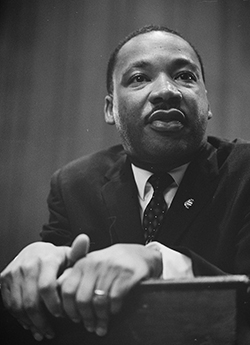The challenges we face in the fight for racial and economic justice have roots in our history as a country.
January 16, 2023
As advocates working toward progressive change, we are often focused on the future. We see the racial and economic disparities facing people with low income and communities of color, and we envision a more equitable future for all.
But it’s important to also consider the places from where we’ve come. The challenges we face in the fight for racial and economic justice have roots in our history as a country. By reexamining the role of race in history, we can reclaim our past and be better equipped to work toward justice.
History is a powerful tool to help shape the future. It reveals attitudes and judgments that framed the laws that govern us today. This legacy of structural racism is embedded in our institutions and the policies they enforce. The consequences are clear: an enormous racial wealth gap, political disenfranchisement, and glaring disparities in health, education, employment, and housing.
Opponents of critical race theory understand the power of history in shaping our understanding of the present. While fostering fear and false narratives about the role of race in our history, they distract us from examining the legacy of structural racism and present-day systemic biases affecting Black, Latino/a/x, Indigenous, Asian, and other people of color today. Our beliefs about race are products of social context. Continuing to whitewash American history holds us back from real progress.

Dr. Martin Luther King, Jr., whose life and legacy we celebrate today, understood the importance of history in building the movement for civil rights. In 1954, he told his congregation, “Instead of making history, we are made by history.” Dr. King admonished his followers to consider how they were influenced by the world around them, and how continuing to conform with social constructs blocked radical transformation.
Today, we again find ourselves at a crossroads. In the face of deep conflict and polarization, basic freedoms and rights are under attack. The Shriver Center’s new event series, Civil Rights at a Crossroads: Igniting Activism for Racial and Economic Justice, will examine these issues and explore parallels between the civil rights movement of the 1960s and the fight for racial justice today.
No one can stand on the sidelines anymore. Ending racism and poverty is critical to sustaining and strengthening our democracy. With a true understanding of history, we can shape policies to create a more equitable future for all. Join us in the fight.

Our laws and policies must support people by ensuring fair work at a living wage and by providing the income supports families need to be successful.
Everyone deserves access to affordable, comprehensive, culturally appropriate healthcare, no matter their income, race, gender, or where they're from.
All people should have the right to a safe, stable home to build better futures for themselves and their families.
Our policies and laws must value families, center communities, and end racial inequities.